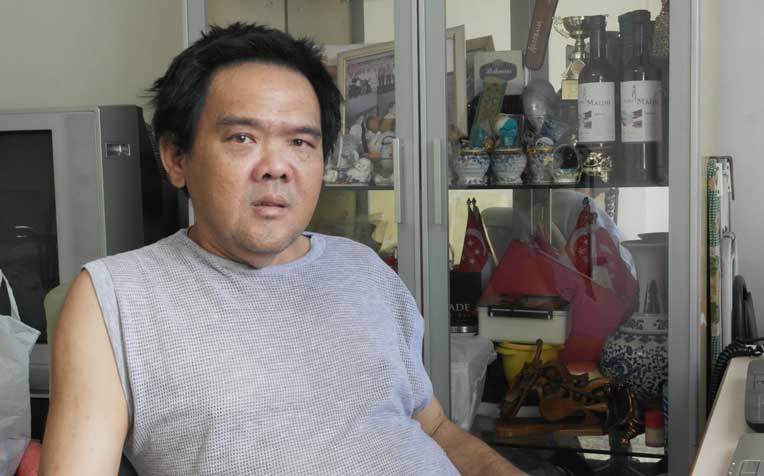
Stroke and end stage renal disease (ESRD) but living well with the support of his family.
On 3rd October 2014, Mr Benny Ang was talking to his mother on the phone when she pointed out that his speech was slurring. He couldn’t believe it; he was having a stroke again. As he was alone at home, he called for an ambulance.
Four days later, Mr Ang found out he had end stage renal disease (ESRD). To improve his chances of survival, he was advised to do kidney dialysis.
“Initially, I didn’t want to do it,” he confessed. “Then they told me I’d die if I don’t.”
He didn’t know he had diabetes before his first stroke
Mr Ang was 44 years old when he suffered a stroke for the first time. A year later, in 2009, he found out that he had diabetes, high cholesterol and high blood pressure too.
He still doesn’t know how he could have gotten the second stroke. As far as he knows, there is no family history of diabetes. Sure, he was a little overweight during NS, but he listened to his officers who encouraged him to lose the excess weight – he gave up soft drinks and has been leading an active lifestyle.
As a Marine Parade resident since 1996, he used to cycle from East Coast Park to Changi Airport and back every day. On top of running his own business, which involves contract works for exhibitions and festive decorations, he was active in community service, serving as an auditor in the Marine Parade Resident’s Committee for more than 10 years.
“Of course I felt sad when I found out I had a stroke again. But I thought, I can’t cry; I just have to face it. It’s not the end,” he said.
Recovering from his second stroke
Mr Ang was hospitalised for two months. During that time, and with the encouragement of his siblings, he went for hemodialysis treatment at the National Kidney Foundation.
When he was discharged from hospital in December 2014, Mr Ang couldn’t walk or eat. His wife had to carry him around the house. Due to his mobility issues, he decided to try peritoneal dialysis (PD), another kind of dialysis where blood filtering is done inside the body through a catheter inserted into the abdominal lining.
His wife underwent training to understand how the Automated Peritoneal Dialysis (APD) cycler works and soon he could do his dialysis in the comfort of his home, and even while he sleeps.
“I was scared in the beginning but I don’t feel pain or discomfort with PD. It’s not a hazard to me, it’s like housework,” he said with a smile.
Two weeks after the start of the new year, his speech improved and he could move around the house with the help of a walker and the railbars that were installed in his flat.
By end of March 2015, and less than three months after he came home, his speech therapist discharged him. His leg and hand movements continue to progress and he can now go to the bathroom without his wife’s assistance. His blood pressure and cholesterol are also under control.
Mr Ang attributes his ongoing recovery to his wife (his primary caregiver) and the support of his siblings, who take turns to accompany him to his follow-up appointments.
His motto is, “You must believe you can get better.”
| Fact Sheet on Benny Ang | |
|---|---|
| Personal data : | 51 years old, married |
| Occupation : | Entrepreneur |
| Hobbies : | Reading the news and exercising |
| Little-known fact : | He survived severe acute respiratory syndrome (SARS) in 2003. |
What are your top 3 tips for people with ESRD?
- Listen to your doctor’s advice
If he/she prescribes you medication, please take them in a timely manner. Don’t hide things from your doctor too as he’s not out to kill you. He can help you. My doctor advised me to walk and exercise and I can see improvements in my condition, even if I’m only walking around my house.
- Avoid oily, sugary and salty foods
Your treatment must go with your diet. Our body needs many types of nutrients including carbohydrates, salt and glucose. But do cut down on oily, sugar-laden and salty foods as far as possible. You don’t need high amounts of them to improve your health. In other words, eat what you like, but in moderation. Be careful not to eat too much or late at night.
- Persevere and stay happy
It’s normal to be sad (when you’re not in the best of health), but don’t just lie down or sleep all day. Think positive and remember that everyone has to go through the same road - birth, illness and then death. Accept your condition and your past choices but also take care of your body. That’s all you can do. Receive the support from your family and loved ones when it is offered. They will help you through.
Ref: Q15
Contributed by














 Get it on Google Play
Get it on Google Play